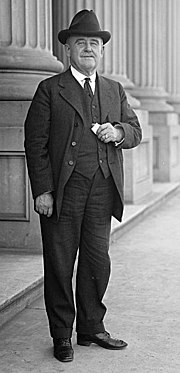William B. McKinley
William Brown McKinley (born September 5, 1856 in Petersburg , Menard County , Illinois , † December 7, 1926 in Martinsville , Indiana ) was an American politician ( Republican Party ) who represented the state of Illinois in both chambers of Congress .
After attending public schools, William McKinley continued his education at the University of Illinois . As a result, he was initially employed as an employee in a drugstore in Springfield before he entered the banking industry in Champaign . He also worked for public utilities and built bridges. From 1902 to 1905 he was a curator at the University of Illinois.
On March 4, 1905, McKinley moved into the United States House of Representatives after a successful election , where he represented the third district of Illinois until March 3, 1913. In 1912 he was defeated by the Democrat Charles M. Borchers and consequently left Congress; in the following election he ran again against Borchers, prevailed and spent three more legislative terms until March 3, 1921 in Congress. During these 14 years in the House of Representatives, he chaired the Committee on Coinage, Weights and Measures .
In 1920 McKinley declined to run for another MP and instead successfully ran for a seat in the United States Senate . He succeeded Lawrence Yates Sherman on March 4, 1921 and was subsequently chairman of the Committee on Manufactures . In 1926, he was denied re-nomination by his party, which chose former Congressman Frank L. Smith in his place . McKinley died before the end of his term on December 7, 1926. Governor Len Small named Smith as his immediate successor, but the Senate denied him his mandate on charges of fraud and corruption. As a result, the Illinois Class 3 seat remained vacant until December 3, 1928, when Otis F. Glenn ultimately succeeded William McKinley.
Web links
- William B. McKinley in the Biographical Directory of the United States Congress (English)
- William B. McKinley in the database of Find a Grave (English)
| personal data | |
|---|---|
| SURNAME | McKinley, William B. |
| ALTERNATIVE NAMES | McKinley, William Brown (full name) |
| BRIEF DESCRIPTION | American politician (Republican Party) |
| DATE OF BIRTH | September 5, 1856 |
| PLACE OF BIRTH | Petersburg , Menard County , Illinois |
| DATE OF DEATH | December 7, 1926 |
| Place of death | Martinsville , Indiana |


